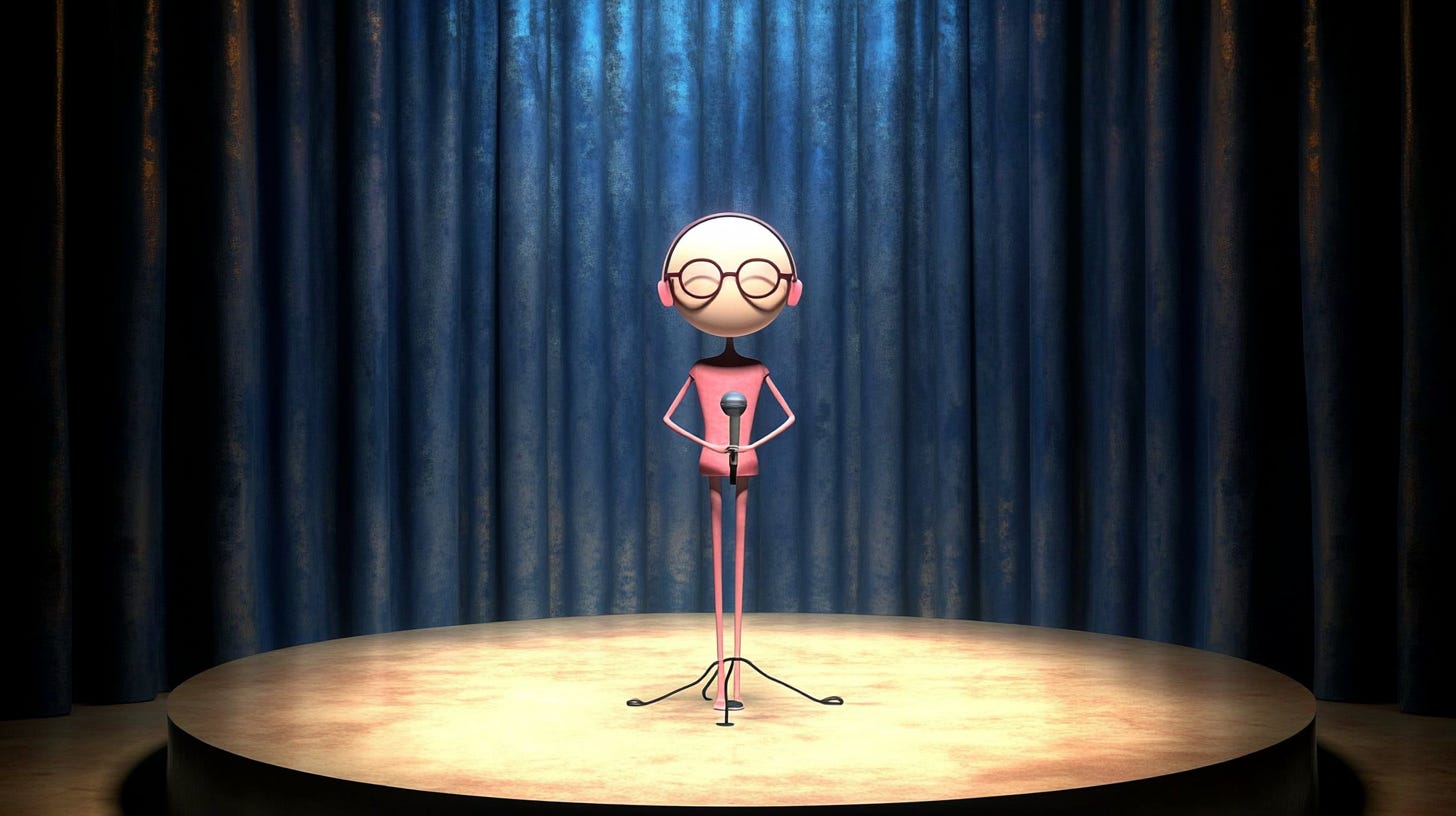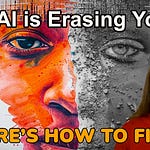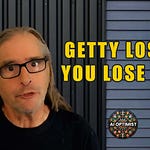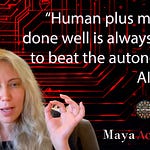While everyone's distracted by OpenAI hiring Jony Ive to design the future of AI hardware, the real story happened 2 weeks ago, at 5pm on a Friday.
The US Copyright Office drops the most significant AI policy document since ChatGPT launched, and nobody noticed.
That's exactly how Big Tech likes it.
And Eric Burgess, CEO of Credtent, has been preparing for this moment.
After 30 years in content and technology, he's built something the AI industry desperately needs but doesn't want to admit: a licensing platform that actually works for creators AND AI developers.
"Credtent.org is not an anti AI company.
Quite the reverse. I think that if we do this right, creative people will feel more comfortable using AI to be a part of creativity.”
Connect with Eric on LinkedIn and on Medium.
I've tested many AI licensing platforms over the past year. Most feel like they were designed by lawyers for billionaires. Small players? Good luck!
Credtent is different. It's intuitive, accessible, and built around a radical idea: you can be pro-AI while fighting for creators' rights.

Here's why that combination should terrify Big Tech.
The AI industry spent two years operating on a simple premise: take content first, ask permission never.
They've trained on everything publicly available, bought pirated 3rd party data, hoping the legal system would sort it out later.
That pretend copyright doesn’t matter strategy just hit a wall.
The Copyright Office document Eric and I discuss doesn't just protect individual creators—it explicitly mentions platforms like Credtent that group smaller creators into licensing pools.
Collective licensing that made me nervous in Episode 93? Might work….
This isn't theoretical anymore. It's policy.
While AI companies burn billions on compute and talent, they've ignored the question: what happens when you have to pay for your training data?
Eric's answer is elegant. Instead of fighting this reality, embrace it. Make it easy. Make it profitable for everyone.
That's what real AI optimism looks like—building bridges instead of burning them.
This B Corp Just Democratized Content Valuation (And Big AI Doesn't Want You To Know Your Work's Worth)
The Copyright Office document didn't just validate creator rights—it specifically mentioned platforms like Credtent that aggregate smaller creators into licensing pools.
That's no coincidence. Eric Burgess has been talking to them all year.
"I met with them when I was speaking at the NAMM conference/
Somebody needed to come out and solve this problem, to orchestrate the relationship between AI companies and creative folks."
Here's what makes Credtent different from the other AI licensing platforms I've tested: it's built for real people, not just Disney and The New York Times.
Most licensing platforms feel like they were designed by IP lawyers for clients with seven-figure legal budgets.
Credtent's interface is clean, intuitive, and—critically—free to register your work.
That matters when you're trying to even out an industry that's historically served only the elite.
But it’s far more than the user experience. It's the business model.
Eric's team groups individual creators into what he calls a:
"standard corpus"—think of it as a content collective that gives independent artists some bargaining power, like mini studios.
When AI companies license this corpus, the revenue gets split based on contribution metrics that Credtent's content valuation expertise helps determine.
"We're experts on content valuation.
This is one of the unfair advantages we have against the competition."
That expertise used to be reserved for major media companies who could afford pricey valuation consultants.
Now a photographer in Ohio or a songwriter in Nashville gets the same level of professional content assessment.
Of course, Credtent is in beta. AI companies will have to respond to the legal and legislative threats around copyright and content for training.
It’s like getting in early, if you have the content they want. If not, protect it.
The 85% revenue share to creators isn't just generous—it's strategic.
As a B Corp, Credtent is legally required to balance profit with purpose. That constraint becomes a competitive advantage when you're trying to build trust with creators who've been burned by platforms before.
"We want to make sure creators have an opportunity to be able to make some money on their work and choose to opt out or license.
But we're also trying to make sure that we're enabling the startups that want to challenge big AI to license as well."
While everyone argues about whether AI training is theft, he's building infrastructure that works for both sides.
AI startups get access to ethically sourced training data through revenue-sharing agreements.
Creators get compensated and maintain agency over their work.
It's not theoretical anymore. The platform launches this summer, with beta testing starting soon.
The question isn't whether AI licensing for creators will happen—the Copyright Office just told us it will.
The question is whether platforms like Credtent can scale fast enough to serve the millions of creators who need this infrastructure.
Eric thinks they can. Based on what I've seen of their platform and approach, I'm optimistic.
Stealing At Scale Is Still Stealing: Can AI Afford To Pay What It Actually Owes?
Here's the uncomfortable question the AI industry has been avoiding for two years: if you actually had to pay for your training data, would your business model survive?
Eric Burgess doesn't mince words about what's really happening.
"Stealing at scale is still stealing.
If you think this through, this is really something that is crushing the American dream because of the millions and millions of people in the creative industry that'll be affected by this."
The timing of the Copyright Office document release—late afternoon on a Friday, followed Saturday by the firing of Copyright Office head Shira Perlmutter—tells you everything about how seriously Big Tech takes this threat to their free lunch.
"It feels very much like our AI bro advisors to the White House have come in and said, get rid of that person.“
The optics are terrible, but the USCO document still stands….so far.
What makes this document matter isn't that it protects creators—it's that it explicitly calls out "market dilution" as a key factor in fair use analysis.
Translation: if AI training destroys the market for original creative work, it's not fair use anymore.
When an AI can generate thousands of stock photos in minutes, what happens to stock photographers?
When it can write marketing copy faster than any human, what happens to copywriters?
The Copyright Office just said: that market impact matters legally.
But here's where it gets interesting for AI companies, especially the smaller ones everyone forgot about while watching OpenAI's latest funding round.
The document doesn't just slam the door on free training data—it opens a window for legitimate licensing.
It specifically mentions platforms that aggregate creators into licensing pools, making ethical AI training data accessible to companies that can't afford billion-dollar media deals.
Eric's been preparing for this moment.
"We've chosen to focus on the fact that this is part of the American Constitution and the dream that you can start a business yourself.
Without intellectual property law that's enshrined in the Constitution, people cannot make a living creating art."
AI companies have raised hundreds of billions claiming they'll create trillions in value.
But if they can't afford to pay creators for training data, were their business models ever real?
Smart AI companies—especially startups competing against well-funded giants—should celebrate this decision.
Instead of whoever can scrape the most data winning, success goes to whoever builds the most efficient licensing relationships.
The most pro-AI position might be supporting creator compensation.
When creators feel secure, they'll actually work with AI companies instead of fighting them.
That's the future Eric is building toward, and the Copyright Office just gave him legal findings to do it.
Why Creatives Are Hiding While AI Takes Their Work (And Why Nobody Noticed the Biggest Copyright Decision in Years)
The music industry figured this out decades ago. Eric's favorite parallel isn't accidental—it's a roadmap.
"We've done this in the recording industry before. You know what happened when we had remix culture and sampling.
It started as theft.
And then we figured out a way to make sure that clearances could happen and people could be compensated when their work is used."
Think about it: Led Zeppelin's "When the Levee Breaks" drum break has been sampled in hundreds of hip-hop tracks.
Each time, Zeppelin gets paid. What started as musical "theft" became a thriving licensing business where original artists and new creators both benefit.
That's the future Eric sees for AI licensing for creators. Not a battle between old and new, but a system where everyone wins.
The timing is perfect: while creatives hide from AI tools that could enhance their work, AI companies are using their content without permission.
Meanwhile, the biggest policy shift in years happens at late afternoon on a Friday, and nobody's paying attention.
The real opportunity emerges while everyone's distracted by the shiny objects.
"Credtent.org is not an anti-AI company. Quite the reverse.
I think that if we do this right, creative people will feel more comfortable using AI to be a part of creativity."
Instead of fighting over a fixed pie, Eric's building a bigger kitchen.
When creators know they're getting compensated, they'll experiment with AI tools.
When AI companies have legitimate access to training data, they build better products.
When licensing becomes as simple as sampling music, it’s good. When it’s like streaming music royalties - the jury is still out on that one.
The Copyright Office document isn't the end of anything—it's the beginning of a more sustainable AI industry.
One where "stealing at scale" gets replaced by "licensing at scale."
Credtent launches this summer. The platform's in beta testing next week. While everyone else argues about what should happen, Eric's building what will happen.
The monks tried to smash Gutenberg's printing press too. That didn't work out. But the printing press didn't destroy scribes—it created publishers, editors, and an entire industry around distributing written knowledge.
AI won't destroy creativity. It'll just change how we value it, compensate for it, and build businesses around it.
The companies that figure this out first—on both sides—will own the next decade.
That's why the most pro-AI company you've never heard of is fighting for creators. They understand that the future isn't AI versus humans.
It's AI with humans, properly compensated, building something neither could create alone.
RESOURCES
Stand Up for Creative Rights in the Age of AI -- Support the US Copyright Office
Eric Burgess -
The creative economy takes center stage
Copyright and Artificial Intelligence, Part 3: Generative AI Training Pre-Publication Version
Five Takeaways from the Copyright Office’s Controversial New AI Repor
Trump fires Copyright Office director after report raises questions about AI training
Librarian of Congress Carla Hayden Fired by White House
=============================
















